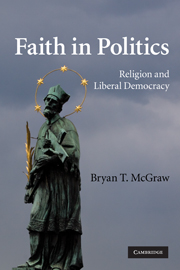Book contents
- Frontmatter
- Contents
- Acknowledgements
- Introduction
- 1 Europe's religious parties and the liberal consensus
- 2 The argument for deliberative restraint
- 3 The problem with secular reasons
- 4 Public reason and religious conflict
- 5 Religion and the problem of political autonomy
- 6 Making the most of conflict: religion and political toleration
- Conclusion: toward a better sort of liberal democracy
- Bibliography
- Index
- References
Bibliography
Published online by Cambridge University Press: 05 June 2012
- Frontmatter
- Contents
- Acknowledgements
- Introduction
- 1 Europe's religious parties and the liberal consensus
- 2 The argument for deliberative restraint
- 3 The problem with secular reasons
- 4 Public reason and religious conflict
- 5 Religion and the problem of political autonomy
- 6 Making the most of conflict: religion and political toleration
- Conclusion: toward a better sort of liberal democracy
- Bibliography
- Index
- References
- Type
- Chapter
- Information
- Faith in PoliticsReligion and Liberal Democracy, pp. 293 - 317Publisher: Cambridge University PressPrint publication year: 2010

